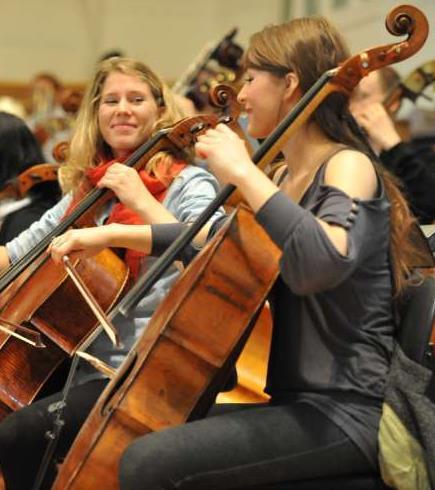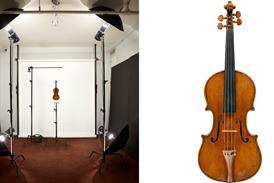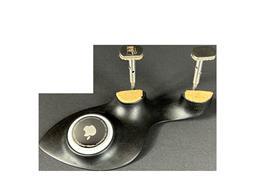Classical music agony aunt Alice McVeigh offers some tips for a harmonious relationship

As an online agony aunt for classical musicians, I’m often asked how to cope with erring desk-partners. Oddly enough, it isn’t players in full-time orchestras who generally write about this (possibly because they’ve sorted it out already; possibly because they’ve lost the will to live). No, most of the desk-partner traumas come from my fellow freelance players and follow a certain pattern:
‘The entire rehearsal my desk-partner continually put the tip of her bow on the bar the conductor indicated. She’d obviously decided that I couldn’t count, didn’t care or was likely to bring shame and anguish on our desk, while I felt more and more fed up. What should I have done?’
‘The guy beside me rushed so badly that the conductor spent half the rehearsal glowering at our desk, and I’m sure the principal will never ask me again. How can I let him know it wasn’t me?’
‘When, Alice, if ever, is it fair on one’s desk-partner to imbibe, between rehearsal and concert, a garlic-laden Korean meal?’
And so on.
As so often, our colleagues in the theatre have it even worse (imagine having to passionately embrace an actor who’s just come back from a Korean restaurant) but it’s still pretty rare for a play to involve actors staying within an arm’s length for the whole of both acts.
Indeed, the proximity issue of orchestral playing has been too infrequently considered. Your husband may detest his boss, but at least he’s not close enough to ascertain his brand of aftershave for six hours a day. Your neighbour may loathe one of her colleagues, but she is not usually obliged to share an enclosed work-space with this person. And in few (if any) other professions is a colleague’s lousy craftsmanship able to wreck so totally the effect of one’s own. (How many of us have soared loftily upwards in an Elgar symphony, only to hear, with sinking soul, clear evidence from behind that yet another lukewarm review is headed our way?)
Attraction, too, is a fact of orchestra players’ lives. Not all desk-partners come straight from the casting books of Slobs I Have Known. Some have foreign accents or divine bow arms. Some make turning the page into a movement of deeply erotic significance – the raised eyebrow, the secret smile. One ex-desk-partner of mine used to launch into fifth position on the G string – completely unnecessarily, mind – with such panache that I still feel warmed-up remembering it. How many relationships must have been made or marred by desk-partnering! No wonder old-fashioned sorts still hanker after the cosy gentlemen’s clubs that orchestras used to be.
Such days are past, luckily, and here are some bang-up-to-the-minute rules I’ve devised for being the perfect desk-partner in the 21st century:
1. Don’t try to teach your desk-partner how to play, however rotten they are. It is occasionally acceptable to mark a note which he has conspicuously missed (put a flat above a B flat, for example) but only if, while doing so, you say something insanely stupid, such as: ‘Sorry, but I have this bizarre genetic disorder, which affects only B and G-flat note recognition.’
2. Should your desk-partner habitually plough-in a fraction early or drag-on a fraction late, you have a choice. If you are on close enough terms with the principal, you could absolve yourself of blame by hinting at the problem in the hope that your desk-partner will get the chop rather than you. However, it is probably better to assume that she has only been booked because of her affair with the fixer. In such a case I recommend you cheese it, trusting to luck that your more sterling musical qualities will also have made their mark.
3. Never patronise your desk-partner, however dreadfully they play. If they maintain a stolid mezzo forte throughout Debussy’s Prélude à l’après-midi d’un faune and your blood pressure hoots up so much that you genuinely think you’re about to die, you could ask them whether they feel you’re blending, as you’ve just put a new string on and it’s a gossamer piece, in spots.
4. Ask permission before decorating the part with fingerings. Other players’ fingerings tend to bug most professionals, but if you really need to put it in, at least ask.
5. Help your desk-partner to get the bowings sorted. It amazes me how often players seem to assume that it’s their right to chat with the basses while you are buzzing up and down like a demented yo-yo trying to puzzle out the hieroglyphics on desk one. OK, it’s a bore, but it ought to be a shared bore.
6. However fascinating your desk-partner may be, you haven’t been hired to flirt. Giggling and prodding your desk-partner is unprofessional, chatting about matters unrelated to the idiocy of the carver in front of you only slightly less so. Keep your mind on the job until the rehearsal’s over.
7. Almost as bad is the desk-partner who never shuts up. If your desk-partner is so chatty that it’s getting you both in bad odour, lean over and whisper: ‘Your sense of humour is so brilliant I can’t concentrate! Save it until the break!’ (You’ll be amazed what some people will believe. A survey some years ago determined that 98 per cent of people believed that they had a better-than-average sense of humour.)
8. Don’t be a lousy page-turner. Don’t whip the page over before midway along the last line and don’t leave it so late that your desk-partner is left hanging mid-phrase like an actor drying up on stage. And don’t flick the page over with your bow: by doing this you are effectively implying you don’t give a damn, not only to your desk-partner but to anyone who might happen to be watching – conductor, fixer, section principal and so on.
9. It is only good desk-partner manners to imbibe substances such as beer or garlic between rehearsal and concert if you sin as a duo. Reeking of perfume, however, is never acceptable.
10. Don’t preen about your fabulous instrument, bow or case. If asked, it’s perfectly OK to admit that you’ve just moved into a gardening shed in East Sheen in order to take out a mortgage on your Gagliano, but don’t flaunt it.
11. Don’t make comments to your desk-partner that you may later regret, especially when guesting with a new orchestra. ‘What a berk the leader is’, will go down badly with the leader’s girlfriend. A wry smile when the leader turns around for the 95th time to display his exquisite phrasing is as far as you can go, until you know for sure that you and your desk-partner are in accord.
12. Never ask your new desk-partner what sort of work they usually do. What you really want to know is how regularly they’re employed with this and various other orchestras, but the implication is blank incredulity that she is regularly employed by anyone beyond the local secretarial agency.
13. If you find yourself in the pub with your desk-partner, it’s traditional for the outside player to buy the first drink for the page-turning player, unless the inside player cocked up so many tricky bits that the rule is by common consent suspended. (It is always worth remembering that no man is a hero to his desk-partner).
One final rule: it’s a courteous notion, if you’ve had a decent experience with a desk-partner, to say you enjoyed it and look forward to seeing her around. And if you’ve suffered the desk-partner from hell, there’s always that time-honoured phrase: ‘It’s been a great pleasure working with you’.



































No comments yet